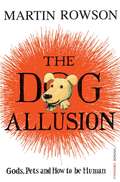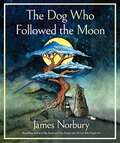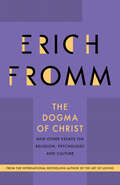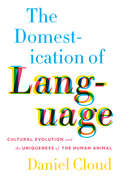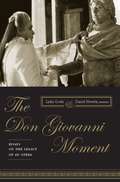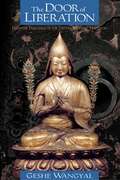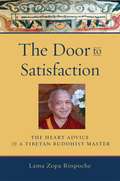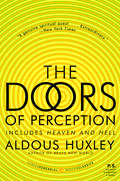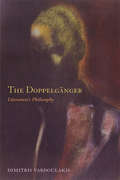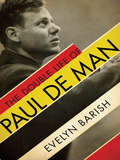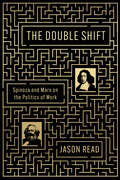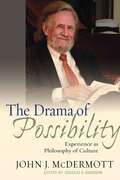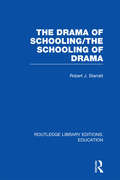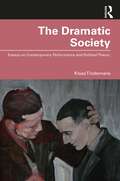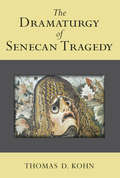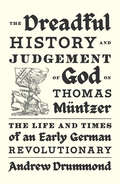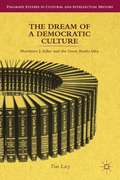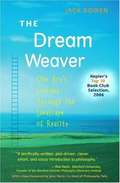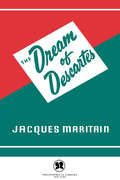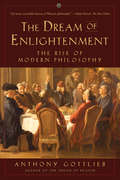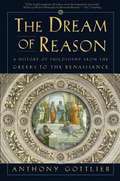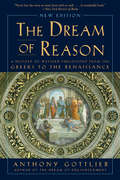- Table View
- List View
The Dog Allusion: Gods, Pets and How to be Human
by Martin Rowson'As with dogs, so with gods - by and large, you should blame the owners.'A particular trait, common to all human civilisations, is the worship of non-human entities with followings of devotees who claim that their reverence can transport them to transcendental heights of complete and unfettered love.Do we mean God? No - we mean Dog. Dogs and other pets we've been keeping and loving since we began walking on two feet. But why do we love God - and pets - so much when their capriciousness sometimes suggests that they don't love us back?In this wise, witty and highly topical book, celebrated cartoonist and novelist Martin Rowson argues that rationally, the whole enterprise of religion is a monumental and faintly ridiculous waste of time and money. But then again, so is pet-keeping.
The Dog Who Followed the Moon
by James NorburyFrom the international bestselling author and illustrator of Big Panda and Tiny Dragon and The Cat Who Taught Zen comes a beautifully illustrated adult fable of a lost young puppy, the old wolf who rescues her, and their journey to follow the moon—with meditations on friendship, connection, and sacrifice.Deep in the mountain forests, a young pup named Amaya wanders lost and alone, until an aging wolf rescues her from a terrifying encounter with his vicious pack. To try and reunite Amaya with her parents, the unlikely pair embark on a journey to follow the moon.Eerie woods, forgotten cities, and other obstacles await Amaya and the Wolf on their adventure. As they make their way through the wilderness, the two learn profound lessons about love, sacrifice, and the importance of embracing change.Featuring stunning artwork from bestselling author and illustrator James Norbury, The Dog Who Followed the Moon is a moving, poignant reflection on love and loss, grief and growth.
The Dogma of Christ: And Other Essays on Religion, Psychology and Culture (Routledge Classics Ser.)
by Erich Fromm&“Fromm&’s developing thought merits the critical attention of all concerned with the human condition and its future.&” —The Washington Post The essays in this fascinating volume examine present-day psychological and cultural problems with the keen insight and humanistic sympathies characteristic of Erich Fromm&’s work.The Dogma of Christ provides some of the sharpest critical insights into how the contemporary world of human destructiveness and violence can no longer separate religion, psychology, and politics. The book brilliantly summarizes Fromm&’s ideas on how culture and society shape our behavior. &“It&’s the new post-religious theme song. The Fromm exhortations are imaginative and he has a definite audience.&” —Kirkus Reviews &“Of all the psychological theorists who have tried to formulate a system better than Freud&’s to approach problems of contemporary life, no one has been more creative or influential than Erich Fromm. He is the most articulate advocate on the role of social forces in molding our character and on our manner of relating to others. This volume is an expansion of his systematic doctrine.&” —Louis L. Lunsky, MD, Archives of Internal Medicine
The Domestication of Language
by Daniel CloudA provocative investigation into the making of human languages and the exceptional nature of human adaptation.
The Domestication of Language: Cultural Evolution and the Uniqueness of the Human Animal
by Daniel CloudLanguage did not evolve only in the distant past. Our shared understanding of the meanings of words is ever-changing, and we make conscious, rational decisions about which words to use and what to mean by them every day. Applying Charles Darwin's theory of "unconscious artificial selection" to the evolution of linguistic conventions, Daniel Cloud suggests a new, evolutionary explanation for the rich, complex, and continually reinvented meanings of our words.The choice of which words to use and in which sense to use them is both a "selection event" and an intentional decision, making Darwin's account of artificial selection a particularly compelling model of the evolution of words. After drawing an analogy between the theory of domestication offered by Darwin and the evolution of human languages and cultures, Cloud applies his analytical framework to the question of what makes humans unique and how they became that way. He incorporates insights from David Lewis's Convention, Brian Skyrms's Signals, and Kim Sterelny's Evolved Apprentice, all while emphasizing the role of deliberate human choice in the crafting of language over time. His clever and intuitive model casts humans' cultural and linguistic evolution as an integrated, dynamic process, with results that reach into all corners of our private lives and public character.
The Don Giovanni Moment: Essays on the Legacy of an Opera
by Goehr Lydia Daniel HerwitzThis is the first book to examine the aesthetic and moral legacy of Mozart's operatic masterpiece in the literature, philosophy, and culture of the nineteenth century. Deeply rooted in the Enlightenment and romanticism, the work functions as icon and myth, and its tensions still resonate today.
The Don Giovanni Moment: Essays on the Legacy of an Opera (Columbia Themes in Philosophy, Social Criticism, and the Arts)
by Goehr Lydia Daniel HerwitzMozart's Don Giovanni is an operatic masterpiece full of iconic and mythical tensions that still resonate today. The work redefines the terms of power, seduction, and morality, and the resulting conflict between the aesthetic and the ethical is deeply rooted in the Enlightenment and romanticism.The Don Giovanni Moment is the first book to examine the aesthetic and moral legacy of Mozart's opera in the literature, philosophy, and culture of the nineteenth century. The prominent scholars in this collection address the opera's impact on the philosophical visions of Kierkegaard, Goethe, and Williams and its influence on the literary and dramatic works of Pushkin, Hoffmann, Mörike, Byron, Wagner, Strauss, and Shaw. Through a close and careful analysis of Don Giovanni's literary and philosophical reception and its many appropriations, rewritings, and retellings, these contributors treat the opera as a vantage point from which theory and philosophy can reconsider romanticism's central themes. As lively and passionate as the opera itself, these essays continue the spirited debate over the meaning and character of Don Giovanni and its powerful legacy. Together they prove that Mozart's brilliant artistic achievement is as potent and relevant today as when it was first performed two centuries ago.
The Door of Liberation: Essential Teachings of the Tibetan Buddhist Tradition
by His Holiness the Dalai Lama Geshe WangyalThis book contains seven fundamental Buddhist texts considered essential to Western students by Geshe Wangyal, who first brought Tibetan Buddhism to America. Ranging from early scriptural sources to meditation and visualization guides of Tibetan Buddhist practice, this is indispensible reading for those interested in opening the door to the highest realms of freedom, wisdom, and compassion.
The Door to Satisfaction
by Lama Thubten Zopa RinpocheIn Door to Satisfaction Lama Zopa Rinpoche reveals a text he discovered in a cave in the Himalayas that captures the essential point of Buddhist training. Rinpoche says, "Only when I read this text did I come to know what the practice of Dharma really means." Without proper motivation, it does not matter what we do. Whether reciting prayers, meditating, or enduring great hardships, if our actions are devoid of good intention they will not become Dharma practice. Proper motivation transcends our ordinary, ephemeral desires and ultimately seeks the happiness of all living beings. "In your life," says Rinpoche, "there is nothing to do other than to work for others, to cherish others. There is nothing more important in your life than this." This powerful, simple message applies to Buddhists and non-Buddhists alike--we all have the power to unlock our greatest potential. Open this book and open the door to a timeless path leading to wisdom and joy.
The Doors of Perception and Heaven and Hell
by Aldous HuxleyHalf an hour after swallowing the drug I became aware of a slow dance of golden lights . . . Among the most profound explorations of the effects of mind-expanding drugs ever written, here are two complete classic books--The Doors of Perception and Heaven and Hell--in which Aldous Huxley, author of the bestselling Brave New World, reveals the mind's remote frontiers and the unmapped areas of human consciousness. This new edition also features an additional essay, "Drugs That Shape Men's Minds," which is now included for the first time.
The Doppelganger: Literature's Philosophy
by Dimitris VardoulakisThe Doppelgänger or Double presents literature as the "double" of philosophy. There are historical reasons for this. The genesis of the Doppelgänger is literature's response to the philosophical focus on subjectivity. The Doppelgänger was coined by the German author Jean Paul in 1796 as a critique of Idealism's assertion of subjective autonomy, individuality and human agency. This critique prefigures post-War extrapolations of the subject as decentred. From this perspective, the Doppelgänger has a "family resemblance" to current conceptualizations of subjectivity. It becomes the emblematic subject of modernity. This is the first significant study on the Doppelgänger's influence on philosophical thought. The Doppelgänger emerges as a hidden and unexplored element both in conceptions of subjectivity and in philosophy's relation to literature. Vardoulakis demonstrates this by employing the Doppelgänger to read literature philosophically and to read philosophy as literature. The Doppelgänger then appears instrumental in the self-conception of both literature and philosophy.
The Double Edged Helix: Social Implications of Genetics in a Diverse Society
by Adrienne Asch Jon Beckwith Peter Conrad Lisa N. Geller Joseph Alper Catherine ArdThe authors address the medical and ethical implications of the new technologies, outlining potential positive and negative effects of genetic research on minorities, people with disabilities, and those of diverse sexual orientations. Presenting a wide array of perspectives, this book emphasizes the need to ensure that research into genetics does not result in discrimination against people on the basis of their DNA.
The Double Life of Paul De Man
by Evelyn BarishA landmark biography that reveals the secret past of one of the most influential academics of the twentieth century. Over thirty years after his death in 1983, Paul de Man, a hugely charismatic intellectual who created with deconstruction an ideology so pervasive that it threatened to topple the very foundations of literature, remains a haunting and still largely unexamined figure. Deeply influential, de Man and his theory-driven philosophy were so dominant that his passing received front-page coverage, suggesting that a cult hero, if not intellectual rock star, had met an untimely end. Yet in 1988, de Man's reputation was ruined when it was discovered that he had written an anti-Semitic article and worked for a collaborating Belgium newspaper during World War II. Who was he, really, and who had he been? No one knew. Still in shock, few of his followers wanted to find out. Once an admirer, although never a theorist, the biographer Evelyn Barish began her own investigation. Relying on years of original archival work and interviews with over two hundred of de Man's circle of friends and family, most of them now dead, Barish vividly re-creates this collaborationist world of occupied Belgian and France. Born in 1919 to a rich but tragically unstable family, Paul de Man, a golden boy, was influenced by his uncle Henri de Man, a socialist turned Nazi collaborator who became the de facto Belgian prime minister. By the early 1940s, Paul, while seemingly only a reviewer for Nazi newspapers, was secretly rising in far more important jobs in Belgium's and France's collaborationist regimes. Postwar, barred from the university, de Man created a publishing house, but stole all its assets; then, facing jail, he fled to New York, abandoning his family (his opportunistic, anti-Semitic writing seemed the least of his crimes). Arriving penniless, he quickly rose again, befriending an entire generation of American writers in New York, including Dwight Macdonald, Elizabeth Hardwick, and Mary McCarthy. Barish sketches de Man's renowned careers at Bard and Yale, as well as the circumstances surrounding his loving--but bigamous--second marriage to former Bard student Patricia Kelley, who created the tranquillity he so lacked. Juxtaposing this personal story to his meteoric rise through American academia, Barish traces the origins of the philosophical deconstructionism that he later created with Jacques Derrida, showing how de Man attracted followers with his attack on the hypocrisy of society that attempts to cover up the "essential alienation" of art from "the system." While focusing on the biographical facts, this commanding and psychologically probing biography reveals as much about human behavior and the cross-currents of twentieth-century intellectual thought as it does about the man who held an entire generation in his thrall.
The Double Shift: Spinoza and Marx on the Politics of Work
by Jason Read"This book is a must read for students of contemporary capitalism."—Kathi Weeks, Duke University"Why do people fight for their exploitation as if it was liberation?" How Marx and Spinoza can explain our perverse attachment to the indignities of workIn a world of declining wages, working conditions, and instability, the response for many has been to work harder, increasing hours and finding various ways to hustle in a gig economy. What drives our attachment to work? To paraphrase a question from Spinoza, "Why do people fight for their exploitation as if it was liberation?"The Double Shift turns towards the intersection of Marx and Spinoza in order to examine the nature of our affective, ideological, and strategic attachment to work. Through an examination of contemporary capitalism and popular culture it argues that the current moment can be defined as one of "negative solidarity."The hardship and difficulty of work is seen not as the basis for alienation and calls for its transformation but rather an identification with the difficulties and hardships of work. This distortion of the work ethic leads to a celebration of capitalists as job creators and suspicion towards anyone who is not seen as a "real worker."The book is grounded in philosophy, specifically Marx and Spinoza, and is in dialogue with Plato, Smith, Hegel, and Arendt, but, at the same time, in examining contemporary ideologies and ideas about work it discusses motivational meetings at Apple Stores, the culture of Silicon Valley, and films and television from Office Space to Better Call SaulThe Double Shift argues for a transformation of our collective imagination and attachment to work.
The Drama of Possibility: Experience as Philosophy of Culture (American Philosophy)
by John J. McDermottThis book traces the trajectory of John J. McDermott’s philosophical career through a selection of his essays. Many were originally occasional pieces and address specific issues in American thought and culture. Together they constitute a mosaic of McDermott’s philosophy, showing its roots in an American conception of experience. Though he draws heavily on the thought of William James and the pragmatists, McDermott has his own unique perspective on philosophy and American life. He presents this to the reader in exquisitely crafted prose. Drawing inspiration from American history, from existentialist themes, and from personal experiences, he offers a dramatic consideration of our culture’s failures and successes. McDermott crosses disciplinary boundaries to draw on whatever works to help make sense of the issues with which he is dealing―issues rooted in medical practice, political events, pedagogical habits, and the worlds of the arts. His work thus resists simple categorization. It is precisely this that makes his vibrant prose appealing to so many both inside and outside the world of American philosophy.
The Drama of Schooling: The Schooling of Drama (Routledge Library Editions: Education)
by Robert J StarrattStarratt’s highly original book offers fresh insights into the nature of teaching, learning, schooling as a multi-cultural, social enterprise, and the importance of vision for that leadership—by using the analogy of drama. Schooling is a preparation to participate in the social drama, both as an individual and as a community. Beyond participation, schooling can enable youngsters to maintain and restore the human purposes of the social drama. This unique book accommodates present critics of schools from both the left and the right, but goes beyond them to offer a script for restoring the schools to their human and social purposes.
The Dramatic Society: Essays on Contemporary Performance and Political Theory
by Klaas TindemansAll societies are, by their very nature, dramatic. They present themselves, especially for those who want to look back in time, as a fascinating and confusing whole of theatrical events and constructions. Sometimes the theatre itself succeeds in capturing that fascination and confusion. This book describes the dramatic society in the form of case studies that link politics, history and culture. The Dramatic Society uses selected plays to examine specific moments in history. Its range of subjects are extremely diverse, including Medea as an icon of terrorism, a choreography based upon Shakespeare’s As You Like It, horror movies about the German unification, a truth commission dealing with "human zoos", and the reconstruction of Ai Weiwei’s troubles with the tax authorities. This collection of insightful essays deals with theatrical performances – including happenings, installations and movies – of the past fifty years, with every chapter attempting to link artistic events with politics and political theory, from Hannah Arendt to Slavoj Žižek. This is a revealing assessment of the ways in which drama and politics become intertwined, offering crucial insights for scholars and students of theatre studies, performance studies, contemporary politics and cultural studies.
The Dramaturgy of Senecan Tragedy
by Thomas D. KohnThe first-century Roman tragedies of Seneca, like all ancient drama, do not contain the sort of external stage directions that we are accustomed to today; nevertheless, a careful reading of the plays reveals such stage business as entrances, exits, setting, sound effects, emotions of the characters, etc. The Dramaturgy of Senecan Tragedy teases out these dramaturgical elements in Seneca's work and uses them both to aid in the interpretation of the plays and to show the playwright's artistry. Thomas D. Kohn provides a detailed overview of the corpus, laying the groundwork for appreciating Seneca's techniques in the individual dramas. Each of the chapters explores an individual tragedy in detail, discussing the dramatis personae and examining how the roles would be distributed among a limited number of actors, as well as the identity of the Chorus. The Dramaturgy of Senecan Tragedy makes a compelling argument for Seneca as an artist and a dramaturg in the true sense of the word: "a maker of drama. " Regardless of whether Seneca composed his plays for full-blown theatrical staging, a fictive theater of the mind, or something in between, Kohn demonstrates that he displays a consistency and a careful attentiveness to details of performance. While other scholars have applied this type of performance criticism to individual tragedies or scenes, this is the first comprehensive study of all the plays in twenty-five years, and the first ever to consider not just stagecraft, but also metatheatrical issues such as the significant distribution of roles among a limited number of actors, in addition to the emotional states of the characters. Scholars of classics and theater, along with those looking to stage the plays, will find much of interest in this study.
The Dreadful History and Judgement of God on Thomas Müntzer: The Life and Times of an Early German Revolutionary
by Andrew DrummondOn the 500th anniversary of the German Peasant Wars, a brilliant portrait of Thomas Munzter: radical millenarian preacher, revolutionary and iconoclast'The princes are nothing but tyrants who flay the people; they fritter away our blood and sweat on their pomp and whoring and knavery.&’ These were the words of Thomas Müntzer at the head of the massed ranks of a peasant army in the year 1525. Ranged against him were the might of the princes of the German Nation. How did Müntzer, the son of a coin maker from central Germany, rise in just a few short years to become one of the most feared revolutionaries in early modern Europe?In this brilliant work of historical excavation, Andrew Drummond charts the life and times of the man Martin Luther denounced as a &‘Ravening Wolf&’ and &‘False Prophet&’. Drummond shows us Müntzer as a human being. Far from the bloodthirsty devil of legend, he was a man of considerable learning and principle, deeply sympathetic to the misery of the peasantry and the poor. In his short life – he was beheaded at thirty-five – Müntzer promised to fundamentally upend German society.Seeking to save Müntzer from the condescension of history, Drummond guides us through the religious and political disputes of the Reformation, placing his life and thought in the context of those turbulent years. The result is a portrait of an often contradictory but always radical figure, one who continues to inspire movements of the poor across the globe.
The Dream Of A Democratic Culture
by Tim LacyThis book presents a moderately revisionist history of the great books idea anchored in the following movements and struggles: fighting anti-intellectualism, advocating for the liberal arts, distributing cultural capital, and promoting a public philosophy, anchored in mid-century liberalism, that fostered a shared civic culture.
The Dream Weaver: One Boy's Journey through the Landscape of Reality
by Jack Bowen"How sure can you be that you're not dreaming right now?" "Up until now, completely sure," I responded. "Dreams aren't really anything like reality. Dreams are, well, they're more dreamy. You can just tell. Things happen in dreams that don't happen in reality. Usually, anyway. " The hero of The Dream Weaver, young Ian Pinkle, encounters a world full of the unknown. With the help of a mentor and a friend or two, he sheds light on some of life's most difficult questions: How do we determine morality? What is the meaning of life? Does God exist? How can we determine Truth? Fairness? What are the mind and soul like? Ian--in his playful, curious manner--addresses these questions in a way that lets readers develop their own answers, and in doing so, he guides the readers through a history of philosophical thought in a clever, conversational and even adventurous style. This allows readers to think for themselves, ask questions themselves--and to be philosophers themselves. Alongside Ian's story are annotations that connect Ian's dilemmas and insights to some of the most renowned thinkers throughout history. Whether Ian is creating universes to explore the apparent paradoxical issues of evil, or playfully addressing (and solving!) the chicken-or-the-egg question, he will provide all readers with both "a ha!" moments and moments that challenge their most firmly rooted foundations. And all the while, there's a nice little surprise waiting at the end.
The Dream of Descartes
by Jacques MaritainThe Dream of Descartes by Francois Mauriac contains articles appearing in 1920 and 1922, a lecture, and other essays. This book was written to determine the value and significance of the Cartesian Reform with regard to metaphysical and theological wisdom. Descartes was also known for his work in producing the Cartesian Theory of Fallacies. This can be most easily explored using the statement: This statement is a lie. While it is most commonly referred to as a paradox, the Cartesian Theory of Fallacies states that at any given time a statement can be both true and false simultaneously because of its contradictory nature. The statement is true in its fallacy. Thus, Descartes developed the Cartesian Theory of Fallacies, which greatly influenced the thinking of the time. Many would-be philosophers were trying to develop inexplicable statements of seeming fact, however, this laid rumors of such a proposition impossible. Many philosophers believe that when Descartes formulated his Theory of Fallacies, he intended to be lying, which in and of itself embodies the theory. Titles in this book are The Deposition of Wisdom, The Cartesian Proofs of God, and The Cartesian Heritage. Mauriac, Franois 1885-1970, French writer. Mauriac achieved success in 1922 and 1923 with Le Baiser au lpreux and Genitrix (tr. of both in The Family, 1930). Generally set in or near his native Bordeaux, his novels are imbued with his profound, though nonconformist, Roman Catholicism. His characters exist in a tortured universe; nature is evil and man eternally prone to sin. His major novels are The Desert of Love (1925, tr. 1929), Thrse (1927, tr. 1928), and Vipers' Tangle (1932, tr. 1933). Other works include The Frontenacs (1933, tr. 1961) and Woman of the Pharisees (1941, tr. 1946); a life of Racine (1928) and of Jesus (1936, tr. 1937); and plays, notably Asmode (1938, tr. 1939). Also a distinguished essayist, Mauriac became a columnist for Figaro after World War II. Collections of his articles and essays include Journal, 1932-39 (1947, partial tr. Second Thoughts, 1961), Proust's Way (1949, tr. 1950), and Cain, Where Is Your Brother? (tr. 1962). Mauriac received the 1952 Nobel Prize in Literature.
The Dream of Enlightenment: The Rise of Modern Philosophy
by Anthony GottliebThe author of the classic The Dream of Reason vividly explains the rise of modern thought. Western philosophy is now two and a half millennia old, but much of it came in just two staccato bursts, each lasting only about 150 years. In his landmark survey of Western philosophy from the Greeks to the Renaissance, The Dream of Reason, Anthony Gottlieb documented the first burst, which came in the Athens of Socrates, Plato, and Aristotle. Now, in his sequel, The Dream of Enlightenment, Gottlieb expertly navigates a second great explosion of thought, taking us to northern Europe in the wake of its wars of religion and the rise of Galilean science. In a relatively short period--from the early 1640s to the eve of the French Revolution--Descartes, Hobbes, Spinoza, Locke, Leibniz, and Hume all made their mark. The Dream of Enlightenment tells their story and that of the birth of modern philosophy. As Gottlieb explains, all these men were amateurs: none had much to do with any university. They tried to fathom the implications of the new science and of religious upheaval, which led them to question traditional teachings and attitudes. What does the advance of science entail for our understanding of ourselves and for our ideas of God? How should a government deal with religious diversity--and what, actually, is government for? Such questions remain our questions, which is why Descartes, Hobbes, and the others are still pondered today. Yet it is because we still want to hear them that we can easily get these philosophers wrong. It is tempting to think they speak our language and live in our world; but to understand them properly, we must step back into their shoes. Gottlieb puts readers in the minds of these frequently misinterpreted figures, elucidating the history of their times and the development of scientific ideas while engagingly explaining their arguments and assessing their legacy in lively prose. With chapters focusing on Descartes, Hobbes, Spinoza, Locke, Pierre Bayle, Leibniz, Hume, Rousseau, and Voltaire--and many walk-on parts--The Dream of Enlightenment creates a sweeping account of what the Enlightenment amounted to, and why we are still in its debt.
The Dream of Reason: A History of Philosophy from the Greeks to the Renaissance
by Anthony Gottlieb"His book...supplant[s] all others, even the immensely successful History of Western Philosophy by Bertrand Russell."--A. C. Grayling Already a classic in its first year of publication, this landmark study of Western thought takes a fresh look at the writings of the great thinkers of classic philosophy and questions many pieces of conventional wisdom. The book invites comparison with Bertrand Russell's monumental History of Western Philosophy, "but Gottlieb's book is less idiosyncratic and based on more recent scholarship" (Colin McGinn, Los Angeles Times). A New York Times Notable Book, a Los Angeles Times Best Book, and a Times Literary Supplement Best Book of 2001.
The Dream of Reason: A History of Western Philosophy from the Greeks to the Renaissance
by Anthony Gottlieb"His book...supplant[s] all others, even the immensely successful History of Western Philosophy by Bertrand Russell."--A. C. Grayling Already a classic, this landmark study of early Western thought now appears in a new edition with expanded coverage of the Middle Ages. This landmark study of Western thought takes a fresh look at the writings of the great thinkers of classic philosophy and questions many pieces of conventional wisdom. The book invites comparison with Bertrand Russell's monumental History of Western Philosophy, "but Gottlieb's book is less idiosyncratic and based on more recent scholarship" (Colin McGinn, Los Angeles Times). A New York Times Notable Book, a Los Angeles Times Best Book, and a Times Literary Supplement Best Book of 2001.
